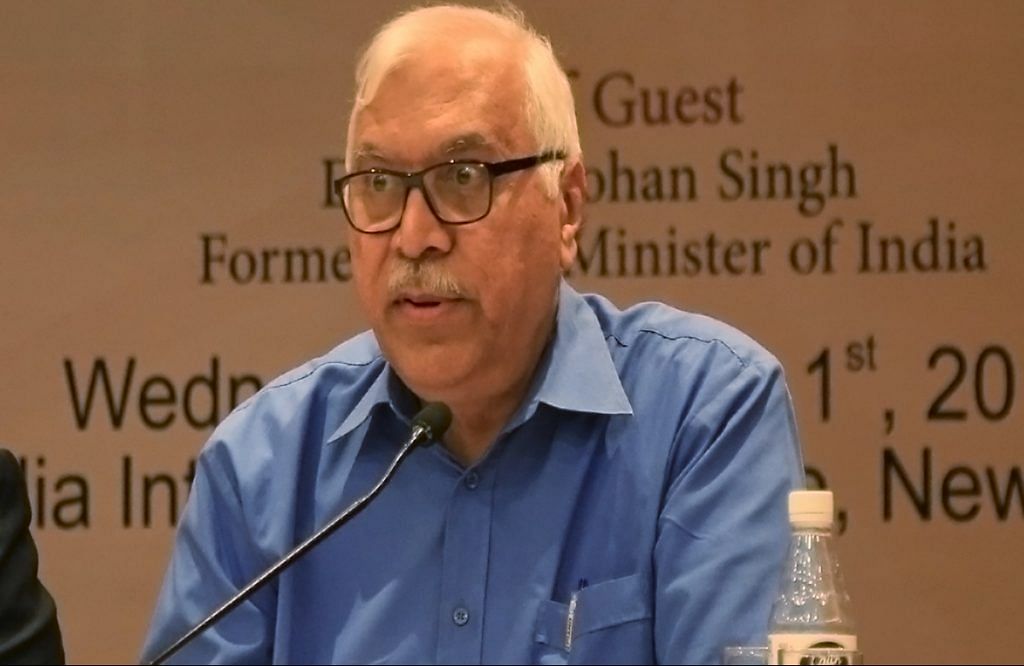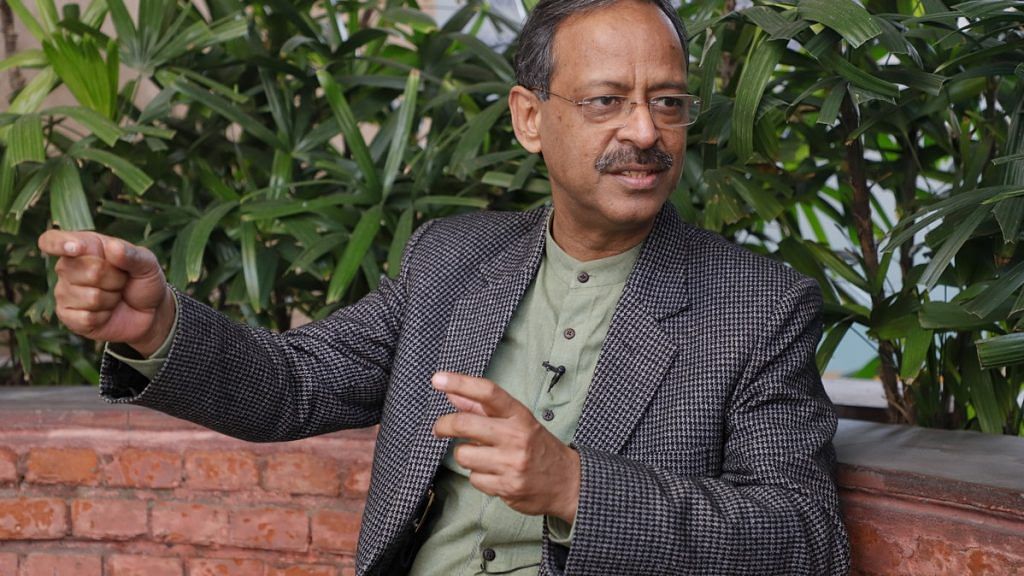New Delhi: Harish Chandra Gupta is a very rare IAS officer — one who retired as a secretary in the Union government, and has since been convicted in 11 high-profile corruption cases and faces the prospect of jail 14 years after retirement.
But former coal secretary H.C. Gupta is even more rare for another unusual reason: Every top IAS officer who knows him, has worked with him, or neither, vouches for his “honesty” and “impeccable integrity” to the last person. Sticking their necks out, on record. It’s not a quality serving or retired bureaucrats are famous for.
They recall his intelligence, his simplicity, and more importantly, his probity in public life. One junior in the IAS recalled seeing Gupta wearing simple clothes, plain sandals, and a jhola on his shoulder, standing on the roadside with his wife and eating golgappas in the capital’s middle-class hub of Sarojini Nagar market.
Little wonder then that retired coal secretary Anil Swarup, who was Gupta’s successor in the ministry, describes the fate that’s befallen the 74-year-old a “Shakespearean tragedy”.
This Monday, a special CBI court in Delhi awarded Gupta a three-year jail term in a coal scam case involving irregularities in the allocation of a coal block in Maharashtra. His then colleague in the coal ministry, former joint secretary K.S. Kropha, was also sentenced to a two-year jail term in the case.
Gupta, who was coal secretary between December 2005 and November 2008, has been accused in 12 cases of alleged irregularities in allocation of coal blocks during the UPA’s tenure. So far, the prosecution has secured convictions in 11 of the 12 cases.
In 2019, the retired IAS officer was acquitted in one case, while in some of the other convictions, his appeal is pending before the Delhi High Court.
Currently out on bail, he has been held guilty of “criminal conspiracy” and “cheating” by the CBI court.
The court has said that, as coal secretary, the screening committee that he headed allocated 40 coal blocks to private companies without due diligence, which resulted in losses to the exchequer. The Supreme Court had in September 2014 cancelled the allocation of over 200 coal blocks, having earlier deemed them as “illegal”.
Despite the accusations and subsequent convictions, Gupta’s colleagues in the service have been vouching for his “impeccable integrity” since the day he was charged, and have maintained that he has unfairly become a “fall guy”.
A major point of contention is that one of the provisions that Gupta was convicted under was Section 13(1)(d)(iii) of the Prevention of Corruption Act, which deals with criminal misconduct by a public servant. This provision was amended in 2018 following criticism that the mere fact of a wrongdoing was enough to implicate an officer, whether or not there was evidence of criminal intent.
While the chargesheet was framed before this section was amended, some IAS officers have questioned why Gupta is being punished under the old “draconian” law.
Also read: ‘No malafide intention’: How CBI’s case against former coal secretary HC Gupta fell apart
‘Government knows he is dead honest’
Gupta is a 1971-batch Uttar Pradesh cadre officer. His career included a stint as the state’s home secretary, soon after Mayawati became the chief minister in 1995.
A retired 1982-batch UP-cadre officer, who has worked with Gupta, recalled that the latter was reputed for his uprightness.
“The CM had received several complaints of corruption about an officer, who also happened to be very powerful. Officers were wary of touching him or giving adverse comments on file,” the retired officer said. “The CM called Gupta, who had a reputation of being fair and honest. After going through the concerned officer’s file, Gupta told the CM the complaints are genuine. Subsequently, action was taken against the officer and he was removed.”
A postgraduate in mathematics and physics, Gupta is described as “extremely intelligent” by batchmates.
Batchmate and former chief election commissioner S.Y. Quraishi said Gupta was a brilliant student and topper of their batch. “He scored 600/600 in the three main subjects. He was also a great sportsperson.”

Besides his integrity, all the civil servants with whom ThePrint spoke also vouched for his inherent simplicity and spartan lifestyle.
The 1982-batch UP-cadre officer recalled that, even as a secretary in the Government of India (GoI), Gupta could be seen enjoying simple pleasures like downing golgappas in Delhi’s bustling Sarojini Nagar market. “I was taken back by his simplicity. One is generally not used to seeing secretary-level officers like this in the Capital,” the officer said.
Quraishi, too, extolled Gupta’s “sadhu-like simplicity”.
“I really do not know what the safeguard is for honest officers,” he said. “The government knows that he is dead honest and that he didn’t get any pecuniary benefits… Shouldn’t they jump to his rescue?”
There are instances galore, Quraishi added, of corrupt officials going scot-free.
“Most corrupt officers do well because they know how to game the system. The UP IAS Association comes out with a list identifying most corrupt officials in the state. Nothing happened to them but here is an officer who has not made an extra penny in life and has been awarded a jail sentence,” he said.
‘Punished under draconian old law’
According to retired coal secretary Anil Swarup, Gupta’s was one of the cases that prompted the government to amend the draconian Section 13(1)(d)(iii) of the Prevention of Corruption (PC) Act.
The section made any civil servant criminally liable if he or she, “while holding office as a public servant, obtains for any person any valuable thing or pecuniary advantage without any public interest”.
Because of the loose wording, the lack of a proper definition for “public interest”, and the fact that it does not require evidence of criminal intent, this section came under criticism.
Swarup said that following pressure from senior civil servants and IAS associations, the government amended the Act, including Section 13(1)(d), in 2018.
The amendment included the provision that a public servant could be said to commit criminal misconduct if “he intentionally enriches himself illicitly during the period of his office” or if “if he dishonestly or fraudulently misappropriates or otherwise converts for his own use any property entrusted to him or any property under his control as a public servant or allows any other person so to do”.

“That is something the government did… because of the request made by the officers’ associations, the government did amend the Act. So it’s not that the government has not done anything,” the retired coal secretary said.
Swarup, however, called it a “Shakespearean tragedy” that, despite the amendment “Gupta continues to be punished under the old law”.
He added that the logic of this was something that could require scrutiny by a high court.
“In my understanding, in many of the cases, the high courts have taken a view that if the law has been amended then how can the accused be held culpable under old provisions? Suppose there is a death sentence for murder. Now the law is amended and it leads to life imprisonment — will the person be hanged? But these are questions that the high court will have to decide,” he said.
Many former and serving IAS officers said that what is happening to Gupta is extremely demoralising for everybody in the service.
“What is happening to him is a complete miscarriage of justice. As a secretary to GoI, you head so many committees and the basic examination of a proposal is done by a number of officers below you. Holding him responsible for something where he was not even the final decision-making authority is beyond anybody’s comprehension,” former agriculture secretary Siraj Hussain, one of Gupta’s juniors from the 1979 batch, said.
In the case for which he was acquitted in 2019, Gupta had asserted that the decision by a screening committee to allot a coal block had been unanimous and not just his. The court had ultimately pronounced that “no malafide intention” could be proved against Gupta.
The question of liability
Swarup said that, if for the sake of argument, Gupta is held liable, then the other members of the screening committee should also be equally liable, including the then PM.
“The PM was privy to all the information to which Mr Harish Gupta was. That being the case, both are equally liable. My personal view is that both are not liable. But if you hold Mr Harish Gupta liable, the PM is equally liable,” Swarup said.
It’s a view that several others agree with.
According to Quraishi, it was evident that Gupta had no intention to benefit himself.
“It is not possible for a secretary to read each and every word in a document… At best there can be allegations of carelessness. But you don’t harass a 74-year-old man after his retirement like this. It’s a travesty of justice.”
According to retired heavy industries secretary Rajan Katoch, Gupta may have made recommendations for allocating coal blocks, but the government took the final call.
“The final decision to allocate the coal block was not made at his level but even then he was held guilty under the draconian Section 13(1)(d) of the Prevention of Corruption Act. It’s a travesty that the section has now been amended but unfortunately it will not apply to his case,” Katoch added.
A rare rallying
Bureaucrats ThePrint spoke to said that it’s not common to see IAS officers, serving and retired, make common cause for another civil servant, but Gupta’s “honesty” has inspired the fraternity to rally behind him.
Back in 2016, the IAS Association pooled in money to help Gupta with financial and legal assistance after he told a CBI court in New Delhi that he would have to plead guilty and go to jail since he could not afford to hire a lawyer on his pension.
A UP-cadre officer, who did not want to be named, told ThePrint that Gupta had refused any financial help from his colleagues, but agreed to getting legal assistance.
Quraishi said that officers cutting across batches and cadres have come forward to help Gupta in any way possible. “Individual officers, both serving and retired, have written columns endorsing Gupta’s reputation,” he added.
IAS officers are also arranging financial and legal help for Kropha.
‘A fall guy’
Many civil servants share the perception that ‘Coalgate’— the name given to the coal cases — may have followed a different trajectory had former Comptroller and Auditor General (CAG) Vinod Rai’ not made allegations public during a 2012 media conference.
The CAG report detailed the alleged illegal allocation of coal blocks between 2004 and 2009 when the UPA government was in power. The CAG at first estimated loss to the exchequer to be around Rs 10.7 lakh crore, but later revised this to Rs 1.86 lakh crore.
By “flashing” this report in front of the media, Rai did “irreparable damage” not just to Gupta but the services, Swarup claimed.
“Had it been looked at objectively, things would have been very different. The real damage that Rai did was to create that vicious environment, where everyone is blinded by the publicity that goes with the viciousness,” he said.
Katoch, too, said that he believed Gupta had become a “fall guy”. “It’s sad because the public perception of the officer known throughout his career as honest has been tarnished in public perception forever, irrespective of the final verdict of the courts.”
This report has been updated with the correction that former agriculture secretary Siraj Hussain is one of Harish Chandra Gupta’s juniors from the 1979 batch.
(Edited by Asavari Singh)
Also read: Punishment postings for civil servants have changed over time, but stigma remains the same



